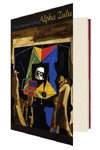“Lester Yates, your blow-up doll / should have stayed in port.” So begins “The Deep Dive Epistle of Watch Section 3,” the funniest and strangest of Gary Copeland Lilley’s poems about his years in the Navy, where he served on a nuclear submarine. Such depths alone won’t make a poet profound, but Lilley does bring to this second book, if not deep wisdom, then serious experience, acquired before and during his uniformed service: the author began (if the poems do hold autobiography) in rural poverty in North Carolina, and spent years (or else he sounds as if he did) in some of the roughest neighborhoods of Washington, D.C. The poems tell stories from difficult places, not so much about the hard luck the characters face as about how and when they face it: “Raven who is also Raymond,” a transsexual from the projects defends herself; “sailors cross the state line, from Portsmouth to Kittery on foot in the freeze, snow knee deep,” to see “Ta Ta’s Triple-X Friday night feature.”
Without such stories there would be no poems, but no good poem is only a story, and Lilley’s power comes partly from his sound: syncopated, densely compacted, defiantly resigned. His happiest poems are defiant displays of hope: an elderly pair of Katrina evacuees see a bouquet in “A peep of red flowers in the woodchips / and weeds by the door of their motel room.” Other scenes point to harsher ironies, as in lines about a storefront church: “Today is worship // and security bars are pulled back.” Ten sonnets take titles from tarot cards (King of Swords, Justice, the Hanged Man), situations from the District, and language, voraciously, from discordant registers—sometimes Latinate, quiet, reflective; sometimes percussive, aggressive, hip-hop: “Don’t believe all those wet-finger stories / caught in the fine hairs of your ear hole. / Even in the part-truths there are salvations… I’m the king of tension, the sharpened knife… but my hand is not on a Glock / looking for no fool, got no cocked hot trigger / waiting on my pull.”
Lilley’s characters act angry or delighted, compulsive, devoted, or satisfied, but when he depicts himself he sounds sad. The title means “A to Z” in the military alphabet; the title poem is “My self-portrait: gray locks in the beard, red eyes // burning back in the mirror, the truths of grooves / and nicks on my face, one missing tooth.” It’s a face for the blues, but it’s the sound made by a conscious worker in words, who wants not a word, and not a soul, wasted or lost. No drug dealer is all bad, no nurse or cleric is all good, and Lilley’s mixed rhythms salute mixed motives: “The gang boys / are riding bicycles around the payphone. / I ain’t leaving unless things get rough, / and I ain’t looking for the law.”
Sometimes, poets devoted to the demotic—the real speech of people who don’t own many books—sacrifice individuality for integrity. The people in such poets’ poems sound real, but alike. Lilley never makes that mistake. Nor does he merely rely on the shock value his poems may retain. When he sounds like anybody, it’s the early Yusef Komunyakaa, who also wrote sad, chiseled poems of black rural life. But Lilley’s bleak humor, his specialty forms (dense prose poems and dense unrhymed sonnets), even his touch of Gullah (see the sonnet “Wahtuh”), are his own.





